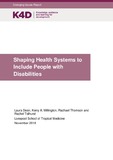| dc.contributor.author | Dean, Laura | |
| dc.contributor.author | Millington, Kerry A. | |
| dc.contributor.author | Thomson, Rachael | |
| dc.contributor.author | Tolhurst, Rachel | |
| dc.date.accessioned | 2019-06-20T08:40:27Z | |
| dc.date.available | 2019-06-20T08:40:27Z | |
| dc.date.issued | 2018-11 | |
| dc.identifier.citation | Dean, L., Millington, K.A., Thomson, R. and Tolhurst, R.(2018). Shaping Health Systems to Include People with Disabilities. K4D Emerging Issues Report. Brighton, UK: Institute of Development Studies. | en |
| dc.identifier.uri | https://opendocs.ids.ac.uk/opendocs/handle/20.500.12413/14549 | |
| dc.description.abstract | The Sustainable Development Goals and the United Nations Convention on the Rights of Persons with Disabilities demands a shift in health system responses to chronic disease and disability, from the medical management and cure of disability to strengthening inclusive health systems to provide a full continuum of care that is people-centred and rights-based. People with disabilities are at a heightened risk of communicable and non-communicable diseases and these diseases can cause debility and disability. Health needs of these people often extend beyond requiring continual long-term medical support to addressing broader social inequities. Key areas that are likely to be critical in re-orientating health systems from a biomedical approach towards inclusive health systems that are more responsive to the needs of people with debility and disability in low and middle-income countries (LMICs) are offered in this report. By bringing together a body of evidence that prioritises the provision of a platform for the voices of people with chronic disease and disability, it is anticipated that this report will contribute toward DFID’s “nothing about us without us” ethos, recognising that the participation of people with chronic disease and disability is essential to equitable health systems development. This report focuses specifically on evidence from LMICs. It includes evidence produced by academic research, as well as information from theoretical or conceptual research, policy papers, institutional literature and, where necessary, press releases and blogs. The provision of practical examples and case studies within the report allows for cross-contextual learning and idea generation. | en |
| dc.language.iso | en | en |
| dc.publisher | IDS | en |
| dc.relation.ispartofseries | K4D Emerging Issue Report;12 | |
| dc.rights.uri | https://www.nationalarchives.gov.uk/doc/open-government-licence/version/3/ | en |
| dc.subject | Development Policy | en |
| dc.subject | Health | en |
| dc.subject | Rights | en |
| dc.subject | Social Protection | en |
| dc.title | Shaping Health Systems to Include People with Disabilities | en |
| dc.type | Emerging Issues Reports | en |
| dc.rights.holder | © DFID - Crown copyright 2019 | en |
| dcterms.dateAccepted | 2018-11 | |
| rioxxterms.funder | Department for International Development, UK Government | en |
| rioxxterms.identifier.project | K4D | en |
| rioxxterms.version | VoR | en |
| rioxxterms.funder.project | 238a9fa4-fe4a-4380-996b-995f33607ba0 | en |

